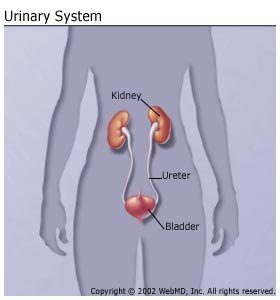
Urinary Tract Infections: From Prevention to Cure
NEXT IN THE SERIES
Symptoms, From Urgency to Burning
How Do Doctors Diagnose and Treat Them?
Cut Your Chances
See More
UTIs, Explained
Urinary tract infections (UTIs) are bacterial infections in the urinary system. They’re very common and usually not serious, though there can be exceptions.
Your urinary tract includes your bladder, kidneys, ureters (two tubes that go from your kidneys to your bladder), and urethra (how urine goes out of your body from your bladder).
If you have a UTI in your kidneys, doctors call it pyelonephritis. If it’s in your bladder, the medical term is cystitis.
Who Gets Urinary Tract Infections?
Anyone can. But UTIs are more likely if you:
Are a woman
Have had UTIs before
Have a condition that affects your bladder's nerve supply (including diabetes, multiple sclerosis, Parkinson's disease, and spinal cord injuries)
Have been through menopause
Are overweight
Have something that blocks the passage of urine, such as a tumor, kidney stone, or an enlarged prostate
Use a contraceptive diaphragm or spermicide for birth control
Have a catheter, a tube placed into the bladder to drain urine from the bladder into a bag outside the body
Are a man who has sex with men, has HIV infection, or hasn’t been circumcised
Most of these traits also raise the chance that a simple bladder infection may become a more serious kidney infection, or turn into sepsis (an infection that has gotten into your bloodstream). For pregnant women, a kidney infection can raise the odds of delivering a baby too early.
Causes
Most UTIs are due to bacteria that are normally found in your gut, such as E. coli. Other bacteria that can cause them include staphylococcus, proteus, klebsiella, enterococcus, and pseudomonas.
Some bladder infections in both men and women are linked to two sexually transmitted bugs: Chlamydia trachomatis and mycoplasma. Another parasite, trichomonas, can cause similar symptoms.
Women are more likely to get urinary tract infections, because the tube that goes from the bladder to the outside (the urethra) is much shorter than in men. Because the urethral opening is closer to the anus in women, it’s easier for bacteria from stool to get into the female urethra. A urinary tract infection may be linked to sex.
In men, a bladder infection is almost always a symptom of another condition. Often, the infection has moved from the prostate or some other part of the body. Or it may mean that a tumor or something else is blocking or interfering with the urinary tract.
Chronic kidney infections in children sometimes happen because of a structural problem that allows urine to flow back from the bladder to the kidneys (reflux), or because the bladder doesn’t empty completely.
WebMD Medical Reference
Reviewed by Trina Pagano, MD on6/, 017
Sources
© 2017 WebMD, LLC. All rights reserved.
Urinary Tract Infections: From Prevention to Cure
NEXT IN THE SERIES
Cut Your Chances
Pregnancy and UTIs
How to Prevent OneIf you think you might have a urinary tract infection, you’ll tell your doctor about your symptoms and start with a urine test. You might need some other tests, too.
https://www.webmd.com/women/uti-17/understanding-urinary-tract-infections-basics
Urinalysis checks your urine sample for white blood cells, blood, and bacteria.
A urine culture is another test that can find the type of bacteria that caused the infection, which will help your doctor choose an antibiotic to give you.
If you tend to get UTIs often, or if you’re a man, your doctor may want to see if something is blocking the flow of your urine or if your pee is going the wrong way back up through your urinary system. In that case, you may get tests such as:
Blood tests
X-rays, CT scans, MRIs, or ultrasound to show your urinary tract
Cystoscopy, in which your doctor inserts a long, thin instrument into your urethra (the tube that carries urine out of your body from your bladder) to check inside your urinary tract
Intravenous pyelogram, an X-ray test that uses dye so your doctor can better see your urinary system
But you wouldn’t get those tests if you have an ordinary UTI and don’t tend to get them a lot.
If you’re pregnant and you have a UTI, be sure to see your doctor promptly, so that you get it treated and stop it before it causes problems in your pregnancy.
Treatments
Bacteria cause most UTIs. If that’s the case for you, then you’ll need to take antibiotics.
A young woman who has a simple bladder infection might get an antibiotic prescription that lasts for just a few days. If her symptoms come back, she might get more tests to rule out other problems.
You might take antibiotics for a longer time, depending on how long you’ve had your UTI and whether you get them often, what caused the infection, and how well your medicines work. Also, men usually have to take antibiotics for weeks if the infection is in their prostate. That’s important to do to make sure the infection doesn’t cause serious problems.
You’ll need to take all the pills in your prescription and follow the instructions to take them on time -- even after you start to feel better. Questions? Ask your doctor or pharmacist. You should also drink lots of water to help wash out the bacteria from your urinary system.
To confirm that the treatment was successful, you may take urine tests 1-2 weeks after you finish the antibiotic. Pregnant women who have been treated for an infection should get a urine test every month until they have their baby.
If you have pain from your UTI, you might want to take medicine for that -- and try a heating pad, too.
If you have bladder pain and pain when you urinate, you may get a bladder anesthetic to curb irritation of the bladder and urethral lining. It normally tints the urine a reddish-orange color.
Surgery
It’s not likely that you’ll need an operation. But you might if your UTI is due to backflow (reflux) of urine from the bladder to the kidneys. Or you could need an operation if a blockage, such as a kidney stone or enlarged prostate, is the cause.
WebMD Medical Reference
Reviewed by Trina Pagano, MD on8/, 017
Sources
https://www.webmd.com/women/uti-17/understanding-urinary-tract-infections-treatment
Hi! I am a robot. I just upvoted you! I found similar content that readers might be interested in:
https://www.webmd.com/a-to-z-guides/understanding-urinary-tract-infections-basics
Be careful. You have already been aware for your post.